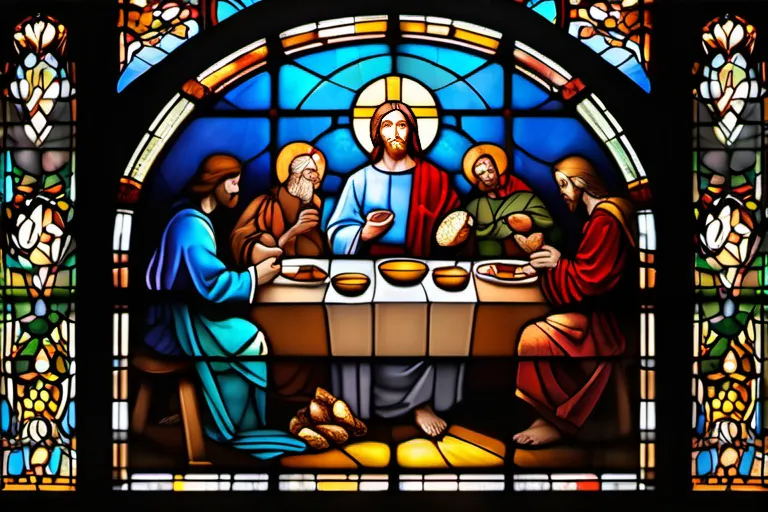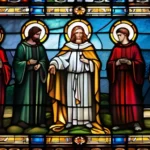Exploring the Theological, Historical, and Symbolic Aspects of the Holy Communion
The Eucharist is a central sacrament in Christianity, symbolizing the Last Supper shared by Jesus Christ with his disciples. In this article, we delve into the profound meaning and significance of the Eucharist across various aspects of Christian faith.
The Historical Origins of the Eucharist
The Eucharist, often referred to as Holy Communion, is more than just a religious ceremony; it’s a profound and transformative experience rooted in history and imbued with deep theological significance. Let’s dive into its historical origins, tracing back to the Last Supper and the early Christian Church.
Imagine being part of the first Passover feast that Jesus shared with his disciples, the night before he was betrayed. According to Matthew 26:26-29, Jesus took bread, blessed it, broke it, and gave it to his disciples, saying, ‘This is my body, which is given for you.’ The act of breaking bread, a simple gesture in itself, became a profound symbol of sacrifice and love. This moment, the Last Supper, laid the foundation for what would later be known as the Eucharist.
During these early days, the Eucharist was not just a ritual but a powerful reminder of Christ’s teachings and sacrifices. The apostles and early Christians gathered regularly to celebrate this sacrament, using it as a means to strengthen their faith and bond with one another. It became a living testament to Jesus’ presence among them, even in absence.
The Eucharist’s historical development can be seen through the eyes of those who first received it. Imagine standing beside these early believers, witnessing how this simple act of sharing bread and wine transformed their lives. The Eucharist wasn’t just about remembering; it was about being transformed into something greater—participants in Christ’s mission, united by his sacrifice.
From the Last Supper to the early Christian communities, the Eucharist has continued to evolve, carrying with it a rich heritage of faith and devotion. Its historical roots are deeply intertwined with the stories of Jesus, making it more than just a religious practice—it’s a living connection between the present and the past.
The Theological Significance of the Eucharist
The Eucharist, often referred to as Holy Communion or the Lord’s Supper, holds a profound theological significance in Christianity. Is it just a ritual, or does it carry a deeper meaning that touches every believer’s soul? To understand its theological essence, we must delve into its sacramental nature and how it symbolizes Christ’s sacrifice.
The Eucharist is a sacrament, a divine action performed by the Church for the salvation of souls. It is more than just an act; it is a tangible expression of God’s love and grace. By participating in this sacrament, believers are united with Christ’s body and blood, symbolizing their spiritual union with Him.
Consider the sacramental nature of the Eucharist as a bridge between heaven and earth. Just like how a marriage ring serves not only as an accessory but also as a tangible sign of commitment, so too does the bread and wine in the Eucharist serve as more than just food; they are symbols that point to Christ’s sacrificial love.
When we partake in the Eucharist, we are dying with Christ (Romans 6:3) and being raised up with Him. This act of breaking bread is not merely a communal meal but a reenactment of the last supper where Jesus instituted this sacrament as a reminder of His sacrifice for our sins. By partaking, we affirm our faith in Christ’s death and resurrection.
Moreover, the Eucharist serves as a communion not only with Christ but also among believers. It fosters unity and fellowship, reinforcing the bond between those who have been united by their common faith. In essence, it is a sacrament of unity, reminding us that we are one in Christ.
The theological significance of the Eucharist thus goes far beyond its external form; it is an invitation to experience the profound grace and love of God. As we gather around the table, we are not just commemorating history but actively participating in a divine mystery that transforms our lives and strengthens our faith.
The Symbolic Importance of the Eucharist
Imagine standing in a church, surrounded by the soft glow of candlelight and the scent of fresh flowers. The congregation gathers around the altar where the bread and wine are laid out on a small white cloth. These simple items carry profound symbolism, acting as more than just food and drink—they represent the body and blood of Christ. How can something so ordinary hold such deep meaning in Christian tradition?
Consider the act of breaking bread. In the context of the Eucharist, it symbolizes communion, not just with God but also among believers. It’s as if each piece of bread is a small piece of Christ, broken for us to consume and become one in Him. Just like how a loaf of bread can be split into countless slices, so too can the community of believers be divided yet united through this shared ritual.
The wine, on the other hand, represents blood. This symbol is rich with meaning, reminding us of Christ’s sacrifice on the cross. When we drink it, we are participating in a memorial of his ultimate act of love and redemption. It’s as if each sip carries the weight of His suffering and the promise of salvation. But why choose wine? Could it be that just like wine can transform from its raw state into something rich and flavorful, so too can Christ’s sacrifice change our lives for the better?
These symbols are more than mere metaphors; they are gateways to a deeper understanding of Christian faith. They remind us of Jesus’ teachings and his ultimate act of love for humanity. Through these rituals, we are not just partaking in a meal but engaging in a profound spiritual experience. The bread and wine become vessels through which Christ’s presence is felt, making the ordinary extraordinary.
The Eucharist in Different Christian Denominations
The Eucharist, often referred to as Holy Communion or the Lord’s Supper, holds a unique place within Christian denominations. How can such a simple act, involving just bread and wine, carry such profound significance? It’s like asking how a single thread can weave through the tapestry of faith, binding hearts together in ways we cannot fully comprehend.
Take the Catholic Church, for instance, where the Eucharist is seen as a real presence of Christ. Is it not fascinating that they believe the bread and wine transform into the body and blood of Jesus? This belief, often referred to as transubstantiation, is a cornerstone of their faith, making the Eucharist more than just a ritual but a mystical experience.
On the other hand, in the Lutheran Church, the Eucharist is understood through the concept of sacramental union. Here, Christ’s body and blood are truly present alongside the elements, much like when drops of water merge into a stream. The question then arises: how does this differ from the Catholic view, and what impact does it have on their worship practices?
Protestants, particularly those in Reformed traditions, often see the Eucharist as an occasion for thanksgiving and remembrance rather than a transubstantiation event. They emphasize participation and communion, asking us to consider if this approach makes the sacrament more accessible or if it diminishes its sacredness.
Methodists and Anglicans hold a middle ground, often combining elements of both Catholic and Protestant perspectives. Their Eucharistic practices reflect a balance, allowing for deep reflection on Christ’s sacrifice while maintaining reverence for the holy elements.
Each denomination brings its unique interpretation to this ancient practice, enriching our understanding of the Eucharist as a multifaceted expression of Christian faith. It’s akin to a musical symphony where each denomination plays its part, creating a harmonious whole that echoes through the ages. How do you think these varying interpretations shape your own understanding and experience of the Eucharist?
The Role of the Eucharist in Christian Worship
Imagine the Eucharist as a golden thread weaving through the fabric of Christian worship, connecting us to our deepest spiritual roots and binding us in a shared act of reverence. How does this practice shape our faith? And what role does it play in our daily lives?
The Eucharist is more than just bread and wine; it’s a profound symbol of communion. Just as sharing a meal brings people together, the Eucharist invites us to share in Christ’s body and blood, reinforcing our bond with God and one another. But why is this so significant?
For centuries, believers have gathered around the altar, not just to remember Jesus’ last supper but to experience His presence in a tangible way. Is it merely a historical reenactment, or does it offer something more? The act of partaking in the Eucharist becomes a moment where reality and faith intersect, turning our abstract beliefs into concrete realities.
Consider the metaphor of a tree: its roots draw nutrients from the soil, nourishing the entire plant. Similarly, the Eucharist can be seen as the source of spiritual sustenance, feeding us with the life-giving grace of Christ. Without it, we might wither and lose our connection to the divine.
Reflect on this question: if the Eucharist is such a powerful symbol of communion, why do some Christians find it so essential? Is it merely about receiving spiritual nourishment, or does it also serve as a moment of accountability, where we are reminded of our responsibilities as followers of Christ?
The Eucharist’s role in Christian worship goes beyond the mere act of sharing bread and wine. It is a celebration of God’s love, a moment of transformation, and a reminder of our ongoing journey with Him. As we partake, we are not just eating a meal; we are participating in an eternal covenant, sealed with Christ’s blood.
So, the next time you receive the Eucharist, pause to reflect on its profound significance. It is more than just a tradition or a ritual—it is a living, breathing expression of your faith and a reminder that God’s love extends beyond time and space, uniting us in an unbreakable bond.
The Impact of the Eucharist on Christian Identity
The Eucharist, often referred to as Holy Communion, is more than just a ritual; it’s a cornerstone that shapes and strengthens the identity of Christian believers. How can something as simple as bread and wine hold such profound significance? Consider this: every time we participate in the Eucharist, aren’t we reminded of our shared humanity and divine mission?
Think about it—when you take part in the Eucharist, are you not being invited to remember the Last Supper where Jesus Christ instituted this sacrament? This act is a powerful reminder that we are united with Him and each other. The breaking of bread symbolizes His sacrifice, but more importantly, it represents our unity as members of Christ’s body.
Imagine if every time you partake in the Eucharist, you feel like you’re weaving threads into a tapestry—each thread representing an individual soul, yet together forming one beautiful and intricate design. This is your identity in Christ, woven through shared communion and mutual support. How does this sense of belonging impact your daily life? Do you find yourself more inclined to serve others or show compassion because of the bonds formed during these holy moments?
The Eucharist also serves as a mirror reflecting our faith and commitment. It challenges us to examine our lives, ensuring that we are walking in step with Christ’s teachings. By partaking in this ritual, aren’t you reaffirming your dedication to His message of love and forgiveness? This act isn’t just about receiving; it’s about giving back—giving yourself fully to the community and to God.
As individuals and as a community, the Eucharist provides a shared experience that transcends personal beliefs. It unites us in a common purpose—to be witnesses of Christ’s love in the world. How can such an act strengthen your resolve? Is there something within you that wakes up when you stand before the altar, ready to receive the bread and wine?
The Eucharist is not just about past memories or future aspirations; it’s a present reality. It challenges us to live out our faith in every moment, reminding us of Christ’s presence and the power He offers for transformation. In this sacrament, we are reminded that we are never alone on our spiritual journey—Christ and His body, the Church, are always with us.
Conclusion
 By understanding the historical, theological, and symbolic importance of the Eucharist, we gain a deeper appreciation for its role in strengthening our spiritual connection with God and fostering unity within the Christian community.
By understanding the historical, theological, and symbolic importance of the Eucharist, we gain a deeper appreciation for its role in strengthening our spiritual connection with God and fostering unity within the Christian community.











